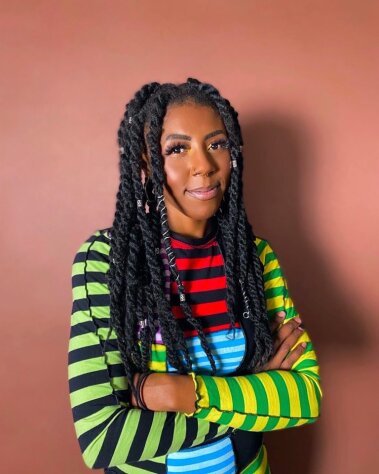PR Has a Diversity Problem. This Executive Wants to Change That.
Maverick PR’s Bryanne Mitchell talks about her new role as DEI Committee Chair of PRSA Colorado.
Veteran publicist Bryanne Mitchell has long observed a disconnect between talented people of color and the world of corporate public relations. The data bears her out. According to the Bureau of Labor Statistics' 2022 report, the PR industry has a diversity problem: 81.4% of public relations specialists identify as white, while only 12.2% identify as Black, 11.9% as Latino or Hispanic, and 2.4% as Asian.
But Mitchell wants to bridge this gap. As the newly appointed DEI Committee Chair for the Public Relations Society of America (PRSA) Colorado chapter, she aims to create initiatives and events that will bring these dynamic communities together in mutually beneficial ways. We sat down with Mitchell to discuss her background and her vision for the future of PR diversity.
Tell us a little bit about your PR origin story.
I'm a military brat and moved around a lot. I was born in Colorado, but I didn't live here until 2005. After high school, I joined the Army to be a journalist. But right when I joined, I learned I would go to a war zone. Thankfully, my active duty was brief.
I was planning to use my GI bill to pay for school, so I didn't know what to do with my life. I knew I liked to write, but I needed to find a way to do it in the digital age. This was a time when blogging was the hip and happening thing. I’d been a singer-songwriter my entire life, so I thought, I'm going to write about music. But then I fell in love with fashion, and I decided to write about that, too.
My blog was called Reflex, and I covered the intersection between fashion and music. The blog was getting a lot of views, but I wasn’t making any money doing it, so I started working as a paralegal at an immigration law firm in Aurora. A bunch of paralegals in our group, a lot of them older, were quitting the firm to become publicists. And I took that as a cue to investigate publicity. That was the joke between lawyers and publicists—the jobs were similar in that we both twisted words to fit our narrative.
I held internships at a few agencies, and a couple of years later, I met my husband, who was doing PR in the music field. We combined our talents and created Color Coded Media Group in 2016. Our mission is to amplify the voices of marginalized communities in music fashion, film, food, and other creative pursuits.
A few years later, I met Shawna Seldon McGregor, founder of Maverick Public Relations. She encouraged me to work with her team on various projects surrounding cannabis and renewable energy companies. I’d done this before, so it was a great fit.
Working with Maverick affords me the freedom to do what I like to do creatively. So, I'm very grateful for that.
What is your new role on the DEI Committee at PRSA Colorado, and what do you hope to accomplish?
I'm helping the organization figure out how to amplify the work of all the black and Brown people in PRSA and outside. PR is traditionally a very Caucasian field. We're going to focus first on finding people from multicultural backgrounds and getting them involved with our organization because of all the resources and prestige it provides.
In my experience with Color Coded Media Group and all the creative stuff I do, there are so many Black and Brown people who do PR work, but they don't call it PR. I want to focus on getting those people involved in this organization. I want to churn out the next Jane Dvorak, and it would be so cool if that was a Black or Brown person.
What’s the biggest challenges facing historically underrepresented groups in the PR industry?
First, I think there is a lack of information about what PR is in the Black and Brown community. In the music industry, there's plenty of “handlers.” They might do something like write press releases, but they don’t call them press releases. They don't follow the standard format, but the PR goal is the same. Others might call themselves “promoters,” setting up conferences and creating events. Again, these are facets of public relations, but they’re not calling it that.
So why is this an issue?
Because there are a good handful of these people who are not sure how to classify their experience on their resumes, and this prevents them from landing PR jobs that they are perfectly qualified for.
Public Relations has its own vocabulary—certain shorthand phrases and words we use—but because many marginalized workers don’t know the buzzwords, they are left out of the conversation. They don’t even know that PRSA exists. I want to change that.
How can joining PRSA help these experienced and aspiring publicists?
PRSA can provide the education you need because of all of the resources that it provides. When I say education, I don't necessarily mean schooling—I mean knowledge about the strategies and culture of corporate PR. I want to expose them to this.
In addition, PRSA offers tremendous networking opportunities. If you work in hip hop, for example, you may be less likely to meet someone like Nancy Whiteman, who is the founder of Wana Brands (a major cannabis edibles company that was founded in Colorado). Being a part of PRSA puts you in contact with corporate players who will help expand your career opportunities. Just being able to shake hands with someone who knows of a job opening gives you an advantage.
Many companies have DEI initiatives and are looking for ways to connect with that community. I want to build a bridge between those two worlds here in Colorado.

